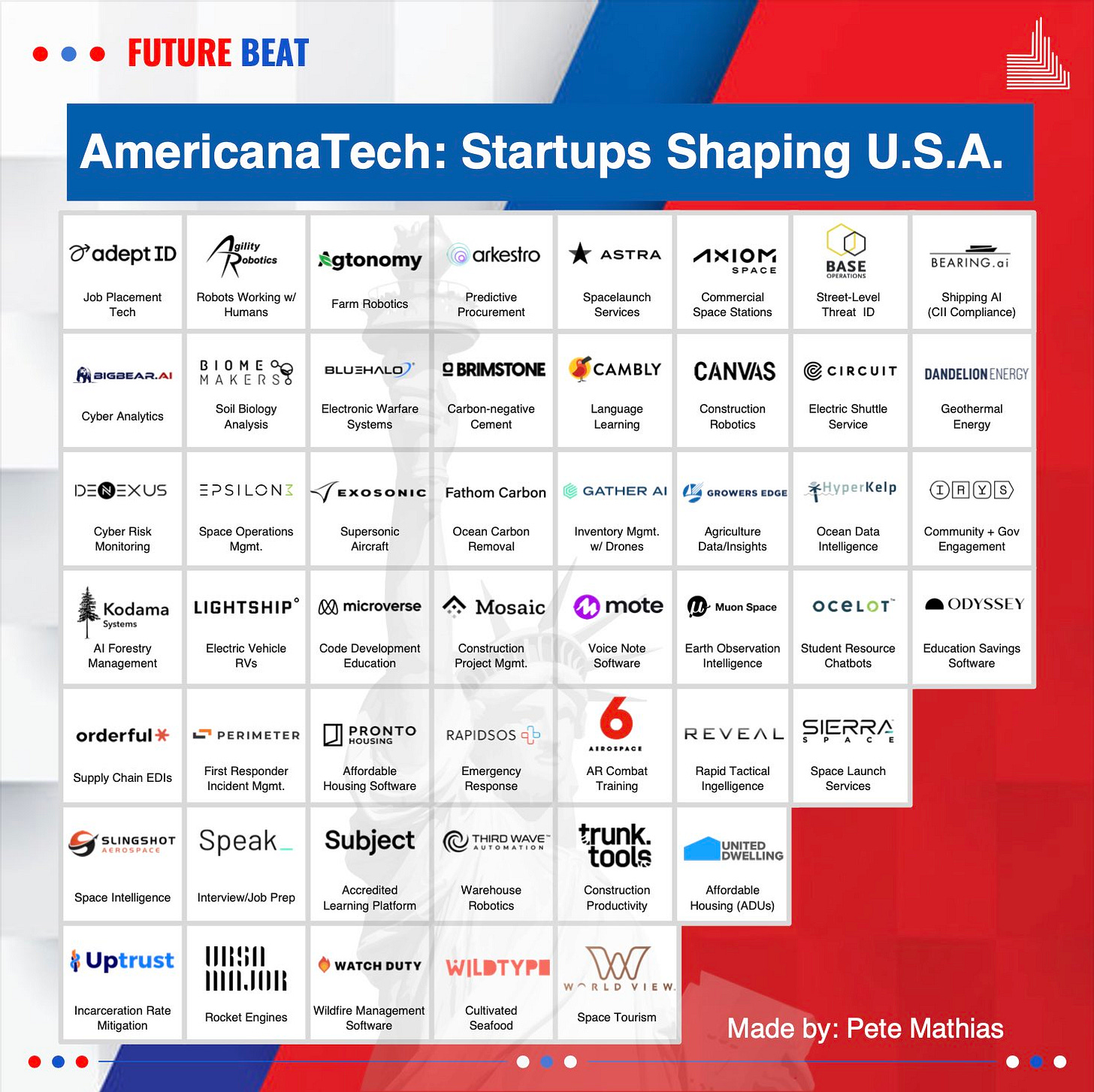Americana Tech: Venture Capital's Next Wild West Frontier
An Investment Framework for the Next 300 Years of U.S. Innovation
I want to share my views on what I believe is the next frontier of innovation and therefore venture investing. It lacks a name so I’ll offer one: Americana Tech.
Why now: A Transition from Geography to Technology
Two forces tend in succession to guide a nation’s development: Geography and then Technology. Put another way: land and how people decide to make use of it.
For example, ancient Romans rose to a regional power due to the Mediterranean, but eventually it was Technology (aqueducts, roads, time-keeping tools, etc.) that birthed the Roman Empire.
The United States is no different. The first 400 years of American history were guided by geography and a (violent) progression across that western frontier. This period lasted from ~1492 (when Columbus “sailed the Ocean Blue”) until ~1893, when the U.S. Census reported American settlers officially occupied all tracts of land, Atlantic to Pacific. At the time, University of Wisconsin professor Frederick Jackson Turner, standing at the World’s Columbian Exposition in Chicago, offered his “frontier thesis”:
And now, four centuries since the discovery of America, at the end of a hundred years of life under the Constitution, the frontier has gone, and with its going has closed the first period of American history.
We are now well into the second chapter of American history, where technology shapes the wet clay of possibility into a calcifying national identity. From railroads to iPhones, from Wifi to A.I.— creativity and entrepreneurship drive our way of life. Who disagrees?
At this particular moment, we are at a crossroads. Technology has put the United States in a position of global preeminence. But what’s next? What are the “Next Big Ideas”? What will tech look like by 2050? By 2150? By 2350?
An Investment Heuristic: A Tale of Two Technologies
These days there are two kinds of venture investments: those with intuitive markets, and those without.
Intuitive investments are in familiar, “every day,” enduring categories of life. For example: health, transportation, safety, school, construction, arts/entertainment. When someone tells you about an intuitive investment thesis, you get it because you live it.
Then there is another camp—more unfamiliar, alien, and “head scratcher” categories. When someone describes these innovation areas, you wonder “what’s the point?” or “who would buy that?” When you question Total Addressable Market, it is likely a “non-intuitive” innovation.
Playing Sherlock: Identifying Intuitive vs. Non-Intuitive Investments
Two illustrations clarifies “intuitive” versus “non-intuitive:”
When you rode Uber for the first time, you did something you’ve done a hundred times in a novel way (get from point A to B). On the other hand, when you were told about NFTs or Bored Apes for the first time you likely had follow-up questions. If you have to ask what is this all about, then it’s likely a non-intuitive investment.
Often times “intuitive markets” correlate with verbs. Actions. How we do things. How we build, learn, move, protect ourselves, inspire, even entertain. If you can easily attach an action verb to the market, “How we XYZ,” it’s likely intuitive.
Why Intuitive Investments Correlate with Country-Building
There is a passage in legendary investor Alan Patricof’s No Red Lights that hit me hard. Decades ago he took a pitch from a French couple that had an idea to re-imagine the experience of waiting for public transportation in New York City. The couple then pitched the idea of the modern “bus stop.” Yes. The. Bus. Stop.
That hit me hard. Even though Mr. Patricof passed on the investment, he took the meeting. No VC today that I know (including me) would take that meeting. And yet it fits the venture profile: big pain point in a big market. Very big and intuitive market.
Founders are quietly re-imagining some of the pillars of civic life. Like the bus stop, their focus areas correlate with country-building, with way-of-being. These innovations build communities and countries.
Definition of Terms: OK, but what do you actually mean by Americana Tech?
There are at least five things that a country (such as America) must do well. These also correspond to five categories that constitute pillars of what I am calling Americana Tech: 1) Protect, 2) Power, 3) Build, 4) Move, and 5) Inspire. For my peer venture capitalists, these encapsulate familiar areas of current investment:
Protect - Tech that helps secure life and property.
How we live healthy lives - Health Tech
How we protect digital property - Cybersecurity
How we protect physical property/persons - Defense Tech
Power - Tech for critical inputs powering the economy
How we source energy - Energy Tech
How we manage resources - Forestry Tech, Agriculture Tech
How we deliver inputs - Supply Chain Tech
Build - Tech for essential hard and soft infrastructure
How we build physical assets - Construction/Infrastructure Tech
How we develop our people - EdTech, Future of Work
Move - Tech to move people and things across and beyond Earth
How we move things on Earth - Land, Sea, Air Tech
How move things beyond Earth - Space Tech
Inspire - Tech that helps win hearts and minds
How we deepen our cultural heritage - Creator Economy
How we strengthen our social communication - Consumer Social
Here is a sample market map I made to give you a taste test:
Why are these relevant areas of investment right now? Because of a critical transition.
Hypothesis: LPs and Investors want Americana Tech
Limited Partners (LPs) seem to want—and deserve— investments in foundational areas described by “Americana Tech.” Why? For at least three reasons:
Scars from non-intuitive investing: The main reason is the scars (by which I mean valuation writedowns/writeoffs) from investments that were hard to understand in the first place. The most extreme examples are discrete categories of obtuse Web3, like crypto (hi FTX) or NFTs (hi Bored Apes).
Difficulties liquidating emerging market positions: Capital that chased alpha in emerging markets (starting in ~2008) has proven hard to exit. Lots of reasons for this, but good illustrations are China (and its tech crackdowns), Brazil (and its market volatility), and India (and difficulty there picking early-stage startups).
Fragility of the global world order and a corresponding nationalization of tech: The pandemic, Russia’s invasion of the Ukraine, supply chain breakdowns and energy crises— LPs, like all of us— see the world order with more loose threads. Brexit, the EU cloud, GDPR, CFIUS, TikTok Ban chats— we are seeing more and more of country claims over tech’s scope.
“Americana Tech” responds to these with an intriguing proposition: invest in companies with “outsized return blueprints” and yet an orientation towards the familiar, close-to-home, and close-to-heart.
Proofpoints: Funds Dedicated to American Development
There are already emerging proofpoints of appetite for “Americana Tech.” These go by different names:
America’s Frontier Fund: Founded in 2021, focused on deep-tech and foundational technologies
A16z’s “American Dynamism Fund: Founded in 2022, focused on companies that support the national interest
1789 Capital: Founded in 2023, focused on companies building next generation of American prosperity
An essential difference versus “Patriotic Capital”
I prefer Americana Tech because it underscores that what we are really talking about is innovation that touches way-of-life. Yes, Americana Tech includes areas like defense or dual-use— but when the innovation lexicon overlaps too much with government (i.e. the way Defense Tech is often associated with the Department of Defense), we limit the universe of possible places innovation can come from. For example, I see defense-tech as really more about “protection” (of life, liberty, property)— and therefore should be seen alongside comps in digital health (which is really about protecting life too).
Sure, I know it feels like a slight nuance in definition of terms. But to me it feels relevant.
Forever Innovative: The Next 300 Years
“Venture capital is a pillar of American power.” Scholar Sebastian Mallaby underscores in Power Law the many ways venture-backed disruption has made the United States and world better off.
Speculation— the preamble to innovation— is in America’s DNA. People forget: America’s settlers had “startup” mindsets and “zero to one” sensibilities. Capitalism and mission intersected at our national emergence. Even Founding Fathers—signatories of the Declaration of Independence—went bankrupt due to their own failed “startup” ideas (Side note: it’s one of reasons the Constitution has an understanding heart towards bankruptcy — i.e. U.S. Constitution - Art 1, Sec 8, Cl. 4).
America will forever innovate.
My disclaimer: Why I believe in Americana Tech
I do have certain biases or formal reasons for being passionate about American development. For starters, I love America. But also:
I have now been to every state in the continental U.S. many many times— every major city and many of the second-tier cities (thanks to my touring drummer days with Filligar).
I am a committed student of American history— I studied U.S. history with the Brits @ University of Oxford and came back to familiar shores for an MPA at Harvard University’s Kennedy School. I hate credential signaling, but I hope it substantiates a lifelong interest and commitment to this area.
I have served as a U.S. Cultural Diplomat representing American arts and innovation abroad (everywhere from Russia to the Middle East, South America and beyond). I did this for for two Presidential administrations on different sides of the aisle (Obama and Trump). This has been the honor of a lifetime.
Furthermore, I am now on the Council on Foreign Relations (CFR), an enduring think tank which thinks about America’s place in the world.
I believe in Americana Tech. Venture Capital is part of the Pax Americana. It finances American Dreams. And that is an investment mindset that thrives in any market.
What’s next?
Please reach out— I’d love to hear from you!
Pete





